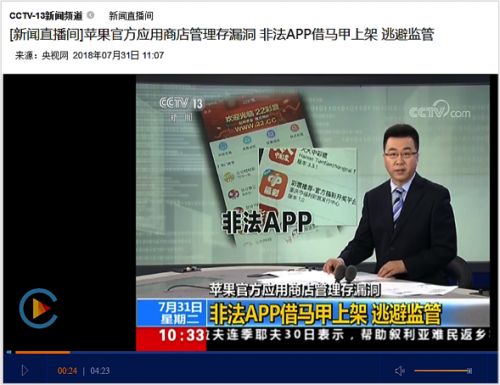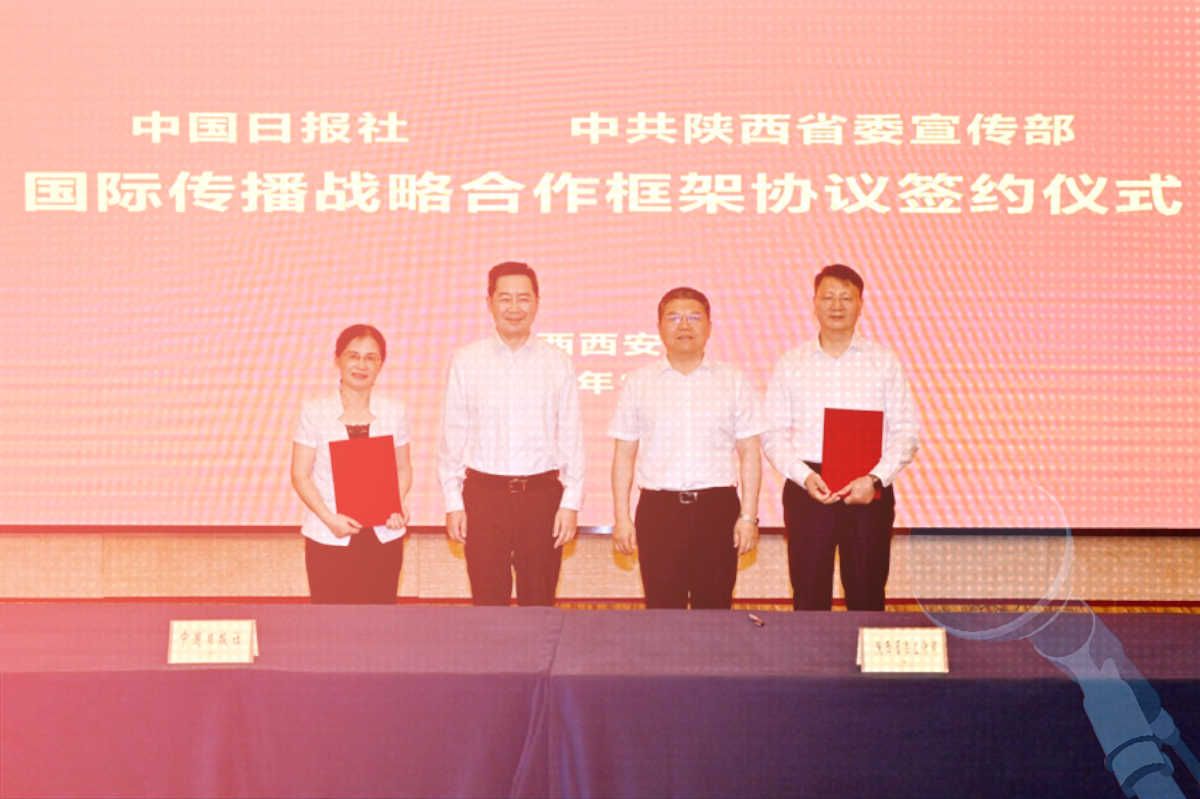Headlines and Hashtags
China Gets a New Cyber Czar
This week we have news of some important reshuffling at the top of the Cyberspace Administration of China (CAC). Zhuang Rongwen (庄荣文), a deputy director at the CAC who was previously in the Overseas Chinese Affairs Office of the State Council, will now take over as director of the CAC, replacing Xu Lin (徐麟), a close ally of Xi Jinping. State media would say only that Xu would be “assigned to other responsibilities,” but it is very likely Xu will be announced this month as the new head of the State Council Information Office, in charge of China’s overseas propaganda strategy.
In other CAC news, it was reported this week that formal charges of corruption have been brought against former CAC chief Lu Wei.
One of the most important stories of the week, however, might be sharp criticism leveled by Chinese state media at the Apple Store for alleged “loopholes” that have resulted in the provision of “illegal” apps for download. One focus of the reporting is the need for more comprehensive regulation of app sales in China — and that could mean greater scrutiny in the not-too-distant future.
This Week in China’s Media
July 28, 2018 to August 3, 2018
➢ Former Deputy Propaganda Minister Lu Wei (鲁炜) Formally Charged in Corruption Case
➢ Zhuang Rongwen (庄荣文) Appointed Director of the Cyberspace Administration of China, Xu Lin Set For New Appointment
➢ Cybersecurity Authorities Nationwide Shut Down 720,000 Accounts in 2nd Quarter 2018, Ministry of Culture and Tourism Investigates 27 Websites
➢ Apple Store Criticized by China Central Television and Other Central Party Media
➢ The Beijing News Criticizes Calls at Tsinghua University for the Firing of Hu Angang
[1] Former Deputy Propaganda Minister Lu Wei (鲁炜) Formally Charged in Corruption Case
According to a notice made on the website of the Supreme People’s Court on July 30, the corruption case against former deputy propaganda minister and Cyberspace Administration of China chief Lu Wei (鲁炜) has now been referred to the prosecutor’s office in Ningbo, Zhejiang province, for investigation and prosecution (审查起诉).
Prosecutors have listed Lu Wei’s alleged crimes as follows: “The plaintiff Lu Wei used the opportunity offered by his positions as a member of the Party leadership group, secretary and deputy director of Xinhua News Agency; as a member of the municipal standing committee, minister of propaganda and deputy mayor of the people’s government of Beijing; as director of the State Internet Information Office (国家互联网信息办公室); as deputy director of the State Council Information Office; as head of the office of the Central Leading Group for Cybersecurity and Informatization; as a deputy director of the Central Propaganda Department and other positions, in order to seek benefit for his own person. [He] used the convenience of his personal position and status, and the conduct of other national government staff, to obtain improper benefits for himself, illegally accepting substantial sums and goods of value (巨额财物), and he should face criminal responsibility for graft and bribery in accord with the law.
Key Chinese Sources:
The Supreme People’s Procuratorate of the People’s Republic of China (高检网): 检察机关依法对鲁炜、莫建成、张杰辉三案提起公诉
[2] Zhuang Rongwen Appointed Director of the Cyberspace Administration of China, Xu Lin Set For New Appointment
On July 31, the Cyberspace Administration of China held a conference of cadres at which Zhou Zuyi (周祖翼), deputy director of the Organization Department of the Chinese Communist Party announced that Zhuang Rongwen (庄荣文) had been appointed the new head of the CAC, replacing Xu Lin (徐麟), who was appointed to the post in June 2016. It is not yet clear what new position was being prepared for Xu Lin, but some have speculated that he is due to take over as head of the State Council Information Office, taking charge of China’s external propaganda efforts.
In related news, the “Office Leadership” section of the CAC website was updated this week, showing that Liu Liehong (刘烈宏) has been serving since last month as deputy director of the CAC. According to Liu’s online resume, he was previously the chief executive officer of China Electronics Technology Group, a state-owned technology equipment manufacturer.
Key Chinese Sources:
China News Service (中国网信网): 中央网信办召开干部大会
People’s Daily Online (人民网): 刘烈宏任中央网信办副主任
[3] Cybersecurity Authorities Nationwide Shut Down 720,000 Accounts in 2nd Quarter 2018, Ministry of Culture and Tourism Investigates 27 Websites
In the second quarter of 2018, the Cyberspace Administration of China and its local and regional offices expanded their enforcement operations across the country, according to state media reports. Inspections were conducted for various types of websites suspected of hosting illegal content. An estimated 446 websites were called in for discussions by authorities, and warnings over illegal content were issued to 167 sites. Jointly with Chinese telecoms authorities, cyberspace authorities cancelled permits and shut down 1,888 sites, and referred 336 cases for investigation by judicial authorities. Violation by the websites in question resulted in the closure of an estimated 720,000 accounts hosted on these web-based platforms.
Focusing on Bilibili (哔哩哔哩), the video sharing site, Kuaikan Comics (快看漫画) and other animation and video sites, the Ministry of Culture and Tourism has instructed its local Cultural Market Enforcement Teams (地方文化市场行政执法总队) to conduct inspections (link to Beijing local office here).
Key Chinese Sources:
China.com.cn (中国网): 传播危害国家安全信息等 1888家网站72万账号被关闭
China National Radio Online (央广网): 文化和旅游部集中执法检查27家网站 下线10万条违规视频
[4] Apple Store Criticized by China Central Television and Other Central Party Media
On July 31, the “Live News” (新闻直播间) program of CCTV News directly criticized the Apple Store for management “loopholes” (漏洞) in the services offered to Chinese users, alleging the offering of “illegal” apps, including those offering online gambling. At the same time, China Youth Daily, a newspaper published by the Chinese Communist Youth League, ran a report called “How a Disguised Lottery App Made It Onto the Shelves” (“伪装”博彩App是如何上架的). The report interviewed Chinese lawyers to suggest that while the domestic Chinese app market is managed by a wide array of departments, including the Cyberspace Administration of China, the Ministry of Industry and Information Technology, the State Administration for Market Regulation, the Public Security Bureau and others, there is still no management system directly dealing with apps. The report argued the need for new policies to better and more directly regulate the app industry.
Key Chinese Sources:
CCTV (央视) “Live News” (新闻直播间): 苹果官方应用商店管理存漏洞 非法APP借马甲上架 逃避监管
China Youth Daily (中国青年报): “伪装”博彩App是如何上架的
[5] The Beijing News Criticizes Calls at Tsinghua University for the Firing of Hu Angang
On August 3, The Beijing News, a newspaper administered by the top leadership of Beijing municipality, ran a commentary responding to calls online by Tsinghua University alumni for the removal of Hu Angang (胡鞍钢), the director of the university’s National Situation Research Center (国情研究院), for his controversial comments over the past year — including in his book “China in 2020: A New Type of Superpower” — that many argue over-hype China’s strengths.
Key Chinese Sources:
The Beijing News Online (新京报网): 高校“浮夸学风”问题需认真对待
Sina.com (新浪网): 胡鞍钢终于说清楚:中国综合实力是怎么超越美国的?





















